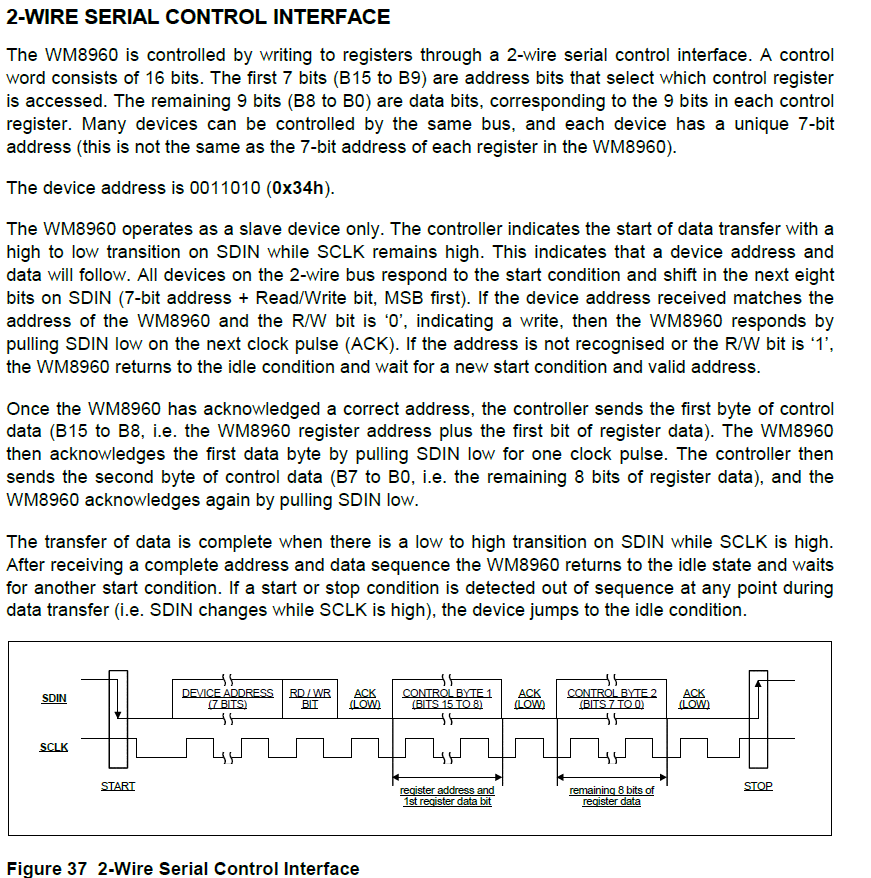wm8960芯片驱动打印寄存器方法
目前在调试wm8960芯片的时候遇到一个问题,需要能够打印wm8960芯片上的寄存器的值。
但是通过wm8960的手册我们知道,它的寄存器地址是7为,数据是9位,不是标准的i2c协议的情况,只支持了i2c来写寄存器,没有实现i2c读寄存器。

但是wm8960驱动在写寄存器的时候,会把写的寄存器的值记录下来,通过看其他的驱动,我们最终确定可以使用以下函数来读取寄存器的值
在文件./sound/soc/soc-io.c中
/**
* snd_soc_component_read() - Read register value
* @component: Component to read from
* @reg: Register to read
* @val: Pointer to where the read value is stored
*
* Return: 0 on success, a negative error code otherwise.
*/
int snd_soc_component_read(struct snd_soc_component *component,
unsigned int reg, unsigned int *val)
{
int ret;
if (component->regmap)
ret = regmap_read(component->regmap, reg, val);
else if (component->driver->read) {
*val = component->driver->read(component, reg);
ret = 0;
}
else
ret = -EIO;
return ret;
}
EXPORT_SYMBOL_GPL(snd_soc_component_read);可以看到该函数需要传入的参数如下:
int snd_soc_component_read(struct snd_soc_component *component,
unsigned int reg, unsigned int *val)
//component:一个struct snd_soc_component的结构体指针
//reg:要读取的寄存器地址
//val:读取后的值要存储的地址
返回值:
//0:读取成功
//其他:读取失败同时,我们也想到了一种操作的方法,可以将wm8960驱动编译成内核模块,通过insmod的时候使用module_param把要读的寄存器的地址传参进去,然后在执行cat /sys/bus/platform/drivers/imx-wm8960/micphone的时候将读到的寄存器的值打印出来
为了实现上面的这个想法,我们要添加的代码如下:
在sound/soc/fsl/imx-wm8960.c文件内的引用头文件的下面增加
static int a;
module_param(a, int, S_IRUSR);
//其中a就是我们传入的要读的寄存器的地址然后我们要实现的函数要放在下面函数中
static ssize_t micphone_show(struct device_driver *dev, char *buf)
{
struct imx_priv *priv = &card_priv;
int mic_status;
/* Check if headphone is plugged in */
mic_status = gpio_get_value(imx_mic_jack_gpio.gpio);
if (mic_status != priv->mic_active_low)
strcpy(buf, "Mic Jack\n");
else
strcpy(buf, "Main MIC\n");
return strlen(buf);
}准备工作完成了,接下来就要好好想想怎么去使用snd_soc_component_read这个函数了,最重要的是如何获得这个函数中的第一个参数component。
首先要看struct snd_soc_component这个结构体在哪里,经过搜索,在./include/sound/soc-dai.h文件中有:
/*
* Digital Audio Interface runtime data.
*
* Holds runtime data for a DAI.
*/
struct snd_soc_dai {
...
/* parent platform/codec */
struct snd_soc_component *component;
...
};原来component在struct snd_soc_dai中,那现在的问题就是找到struct snd_soc_dai这个结构体了,我们在sound/soc/fsl/imx-wm8960.c文件中看到了获得的方法:
static int imx_hifi_hw_params(struct snd_pcm_substream *substream,
struct snd_pcm_hw_params *params)
{
struct snd_soc_pcm_runtime *rtd = substream->private_data;
struct snd_soc_dai *codec_dai = rtd->codec_dai;
...
}所以现在的问题又变成了如何获得struct snd_soc_pcm_runtime *rtd,同样是在sound/soc/fsl/imx-wm8960.c文件中,我们看到了获得的方法
static int imx_wm8960_late_probe(struct snd_soc_card *card)
{
struct snd_soc_pcm_runtime *rtd = list_first_entry(
&card->rtd_list, struct snd_soc_pcm_runtime, list);
...
}所以现在的问题又变成了如何获得struct snd_soc_card *card,同样是在sound/soc/fsl/imx-wm8960.c文件中,我们在文件的开头可以看到
struct imx_wm8960_data {
struct snd_soc_card card;
struct clk *codec_clk;
unsigned int clk_frequency;
bool is_codec_master;
bool is_codec_rpmsg;
bool is_stream_in_use[2];
bool is_stream_opened[2];
struct regmap *gpr;
unsigned int hp_det[2];
u32 asrc_rate;
u32 asrc_format;
};struct snd_soc_card *card在struct imx_wm8960_data里,所以现在的问题又变成了如何获得struct imx_wm8960_data
在sound/soc/fsl/imx-wm8960.c文件的probe函数中我们可以看到
static int imx_wm8960_probe(struct platform_device *pdev)
{
...
struct imx_wm8960_data *data;
...
data = devm_kzalloc(&pdev->dev, sizeof(*data), GFP_KERNEL);
if (!data) {
ret = -ENOMEM;
goto fail;
}
...
}这里就已经获得了struct imx_wm8960_data *data,那我们直接拿来用就可以了
首先定义一个全局变量tttest;
static struct imx_wm8960_data *tttest;然后再probe函数中拿到struct imx_wm8960_data *data
static int imx_wm8960_probe(struct platform_device *pdev)
{
...
struct imx_wm8960_data *data;
...
data = devm_kzalloc(&pdev->dev, sizeof(*data), GFP_KERNEL);
if (!data) {
ret = -ENOMEM;
goto fail;
}
tttest = data;
...
}然后在micphone_show函数中一步步拿到我们最终想要的struct snd_soc_component,最后再传入snd_soc_component_read函数中即可
micphone_show函数改动如下
static ssize_t micphone_show(struct device_driver *dev, char *buf)
{
+ int ret;
+ unsigned int val;
struct imx_priv *priv = &card_priv;
int mic_status;
+ struct snd_soc_pcm_runtime *rtd = list_first_entry(
+ &tttest->card.rtd_list, struct snd_soc_pcm_runtime, list);
+ struct snd_soc_dai *codec_dai = rtd->codec_dai;
+
+ ret = snd_soc_component_read(codec_dai->component,a, &val);
+
+ printk("----%03x\n",val);
+
/* Check if headphone is plugged in */
mic_status = gpio_get_value(imx_mic_jack_gpio.gpio);
最后编译内核以及模块,在linux命令行操作即可,以读0x07寄存器为例:
echo 7 > /proc/sys/kernel/printk
insmod snd-soc-imx-wm8960.ko a=0x07
cat /sys/bus/platform/drivers/imx-wm8960/micphone以上便是解决此问题的全过程,其实解决类似问题的思路无非就是找到我们需要的函数,然后再一层一层的去找该如何去拿到我们想要的参数。下面是完整的patch
diff --git a/arch/arm64/boot/dts/freescale/OK1028A-C.dts b/arch/arm64/boot/dts/freescale/OK1028A-C.dts
index c45185663..78510a442 100644
--- a/arch/arm64/boot/dts/freescale/OK1028A-C.dts
+++ b/arch/arm64/boot/dts/freescale/OK1028A-C.dts
@@ -82,6 +82,7 @@
audio-codec = <&wm8960>;
codec-master;
hp-det = <3 0>;
+ mic-det-gpios = <&gpio3 0 0>;
audio-routing =
"Headphone Jack", "HP_L",
"Headphone Jack", "HP_R",
diff --git a/sound/soc/fsl/Makefile b/sound/soc/fsl/Makefile
index 630a39ae8..cb7acb9a9 100644
--- a/sound/soc/fsl/Makefile
+++ b/sound/soc/fsl/Makefile
@@ -105,7 +105,7 @@ obj-$(CONFIG_SND_SOC_IMX_ES8328) += snd-soc-imx-es8328.o
obj-$(CONFIG_SND_SOC_IMX_CS42888) += snd-soc-imx-cs42888.o
obj-$(CONFIG_SND_SOC_IMX_SGTL5000) += snd-soc-imx-sgtl5000.o
obj-${CONFIG_SND_SOC_IMX_WM8958} += snd-soc-imx-wm8958.o
-obj-$(CONFIG_SND_SOC_IMX_WM8960) += snd-soc-imx-wm8960.o
+obj-m += snd-soc-imx-wm8960.o
obj-$(CONFIG_SND_SOC_IMX_WM8524) += snd-soc-imx-wm8524.o
obj-$(CONFIG_SND_SOC_IMX_WM8962) += snd-soc-imx-wm8962.o
obj-$(CONFIG_SND_SOC_IMX_SII902X) += snd-soc-imx-sii902x.o
diff --git a/sound/soc/fsl/imx-wm8960.c b/sound/soc/fsl/imx-wm8960.c
index 9005b5e36..95365c035 100644
--- a/sound/soc/fsl/imx-wm8960.c
+++ b/sound/soc/fsl/imx-wm8960.c
@@ -26,6 +26,9 @@
#include "../codecs/wm8960.h"
#include "fsl_sai.h"
+static int a;
+module_param(a, int, S_IRUSR);
+
struct imx_wm8960_data {
struct snd_soc_card card;
struct clk *codec_clk;
@@ -48,6 +51,8 @@ struct imx_priv {
struct platform_device *asrc_pdev;
};
+static struct imx_wm8960_data *tttest;
+
static struct imx_priv card_priv;
static struct snd_soc_jack imx_hp_jack;
@@ -165,9 +170,19 @@ static ssize_t headphone_show(struct device_driver *dev, char *buf)
static ssize_t micphone_show(struct device_driver *dev, char *buf)
{
+ int ret;
+ unsigned int val;
struct imx_priv *priv = &card_priv;
int mic_status;
+ struct snd_soc_pcm_runtime *rtd = list_first_entry(
+ &tttest->card.rtd_list, struct snd_soc_pcm_runtime, list);
+ struct snd_soc_dai *codec_dai = rtd->codec_dai;
+
+ ret = snd_soc_component_read(codec_dai->component,a, &val);
+
+ printk("----%03x\n",val);
+
/* Check if headphone is plugged in */
mic_status = gpio_get_value(imx_mic_jack_gpio.gpio);
@@ -470,6 +488,8 @@ static int imx_wm8960_probe(struct platform_device *pdev)
goto fail;
}
+ tttest = data;
+
if (of_property_read_bool(pdev->dev.of_node, "codec-rpmsg"))
data->is_codec_rpmsg = true;